mobility
-
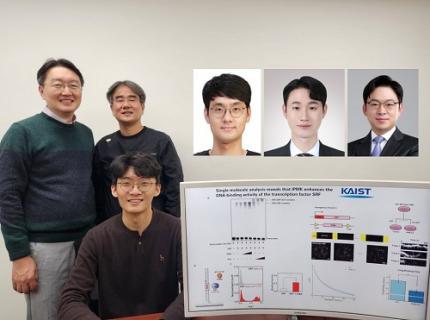 KAIST Uncovers the Principles of Gene Expression Regulation in Cancer and Cellular Functions
< (From left) Professor Seyun Kim, Professor Gwangrog Lee, Dr. Hyoungjoon Ahn, Dr. Jeongmin Yu, Professor Won-Ki Cho, and (below) PhD candidate Kwangmin Ryu of the Department of Biological Sciences>
A research team at KAIST has identified the core gene expression networks regulated by key proteins that fundamentally drive phenomena such as cancer development, metastasis, tissue differentiation from stem cells, and neural activation processes. This discovery lays the foundation for developing innovative therapeutic technologies.
On the 22nd of January, KAIST (represented by President Kwang Hyung Lee) announced that the joint research team led by Professors Seyun Kim, Gwangrog Lee, and Won-Ki Cho from the Department of Biological Sciences had uncovered essential mechanisms controlling gene expression in animal cells.
Inositol phosphate metabolites produced by inositol metabolism enzymes serve as vital secondary messengers in eukaryotic cell signaling systems and are broadly implicated in cancer, obesity, diabetes, and neurological disorders.
The research team demonstrated that the inositol polyphosphate multikinase (IPMK) enzyme, a key player in the inositol metabolism system, acts as a critical transcriptional activator within the core gene expression networks of animal cells. Notably, although IPMK was previously reported to play an important role in the transcription process governed by serum response factor (SRF), a representative transcription factor in animal cells, the precise mechanism of its action was unclear.
SRF is a transcription factor directly controlling the expression of at least 200–300 genes, regulating cell growth, proliferation, apoptosis, and motility, and is indispensable for organ development, such as in the heart.
The team discovered that IPMK binds directly to SRF, altering the three-dimensional structure of the SRF protein. This interaction facilitates the transcriptional activity of various genes through the SRF activated by IPMK, demonstrating that IPMK acts as a critical regulatory switch to enhance SRF's protein activity.
< Figure 1. The serum response factor (SRF) protein, a key transcription factor in animal cells, directly binds to inositol polyphosphate multikinase (IPMK) enzyme and undergoes structural change to acquire DNA binding ability, and precisely regulates growth and differentiation of animal cells through transcriptional activation. >
The team further verified that disruptions in the direct interaction between IPMK and SRF lead to the reduced functionality and activity of SRF, causing severe impairments in gene expression.
By highlighting the significance of the intrinsically disordered region (IDR) in SRF, the researchers underscored the biological importance of intrinsically disordered proteins (IDPs). Unlike most proteins that adopt distinct structures through folding, IDPs, including those with IDRs, do not exhibit specific structures but play crucial biological roles, attracting significant attention in the scientific community.
Professor Seyun Kim commented, "This study provides a vital mechanism proving that IPMK, a key enzyme in the inositol metabolism system, is a major transcriptional activator in the core gene expression network of animal cells. By understanding fundamental processes such as cancer development and metastasis, tissue differentiation from stem cells, and neural activation through SRF, we hope this discovery will lead to the broad application of innovative therapeutic technologies."
The findings were published on January 7th in the international journal Nucleic Acids Research (IF=16.7, top 1.8% in Biochemistry and Molecular Biology), under the title “Single-molecule analysis reveals that IPMK enhances the DNA-binding activity of the transcription factor SRF" (DOI: 10.1093/nar/gkae1281).
This research was supported by the National Research Foundation of Korea's Mid-career Research Program, Leading Research Center Program, and Global Research Laboratory Program, as well as by the Suh Kyungbae Science Foundation and the Samsung Future Technology Development Program.
2025.01.24 View 9897
KAIST Uncovers the Principles of Gene Expression Regulation in Cancer and Cellular Functions
< (From left) Professor Seyun Kim, Professor Gwangrog Lee, Dr. Hyoungjoon Ahn, Dr. Jeongmin Yu, Professor Won-Ki Cho, and (below) PhD candidate Kwangmin Ryu of the Department of Biological Sciences>
A research team at KAIST has identified the core gene expression networks regulated by key proteins that fundamentally drive phenomena such as cancer development, metastasis, tissue differentiation from stem cells, and neural activation processes. This discovery lays the foundation for developing innovative therapeutic technologies.
On the 22nd of January, KAIST (represented by President Kwang Hyung Lee) announced that the joint research team led by Professors Seyun Kim, Gwangrog Lee, and Won-Ki Cho from the Department of Biological Sciences had uncovered essential mechanisms controlling gene expression in animal cells.
Inositol phosphate metabolites produced by inositol metabolism enzymes serve as vital secondary messengers in eukaryotic cell signaling systems and are broadly implicated in cancer, obesity, diabetes, and neurological disorders.
The research team demonstrated that the inositol polyphosphate multikinase (IPMK) enzyme, a key player in the inositol metabolism system, acts as a critical transcriptional activator within the core gene expression networks of animal cells. Notably, although IPMK was previously reported to play an important role in the transcription process governed by serum response factor (SRF), a representative transcription factor in animal cells, the precise mechanism of its action was unclear.
SRF is a transcription factor directly controlling the expression of at least 200–300 genes, regulating cell growth, proliferation, apoptosis, and motility, and is indispensable for organ development, such as in the heart.
The team discovered that IPMK binds directly to SRF, altering the three-dimensional structure of the SRF protein. This interaction facilitates the transcriptional activity of various genes through the SRF activated by IPMK, demonstrating that IPMK acts as a critical regulatory switch to enhance SRF's protein activity.
< Figure 1. The serum response factor (SRF) protein, a key transcription factor in animal cells, directly binds to inositol polyphosphate multikinase (IPMK) enzyme and undergoes structural change to acquire DNA binding ability, and precisely regulates growth and differentiation of animal cells through transcriptional activation. >
The team further verified that disruptions in the direct interaction between IPMK and SRF lead to the reduced functionality and activity of SRF, causing severe impairments in gene expression.
By highlighting the significance of the intrinsically disordered region (IDR) in SRF, the researchers underscored the biological importance of intrinsically disordered proteins (IDPs). Unlike most proteins that adopt distinct structures through folding, IDPs, including those with IDRs, do not exhibit specific structures but play crucial biological roles, attracting significant attention in the scientific community.
Professor Seyun Kim commented, "This study provides a vital mechanism proving that IPMK, a key enzyme in the inositol metabolism system, is a major transcriptional activator in the core gene expression network of animal cells. By understanding fundamental processes such as cancer development and metastasis, tissue differentiation from stem cells, and neural activation through SRF, we hope this discovery will lead to the broad application of innovative therapeutic technologies."
The findings were published on January 7th in the international journal Nucleic Acids Research (IF=16.7, top 1.8% in Biochemistry and Molecular Biology), under the title “Single-molecule analysis reveals that IPMK enhances the DNA-binding activity of the transcription factor SRF" (DOI: 10.1093/nar/gkae1281).
This research was supported by the National Research Foundation of Korea's Mid-career Research Program, Leading Research Center Program, and Global Research Laboratory Program, as well as by the Suh Kyungbae Science Foundation and the Samsung Future Technology Development Program.
2025.01.24 View 9897 -
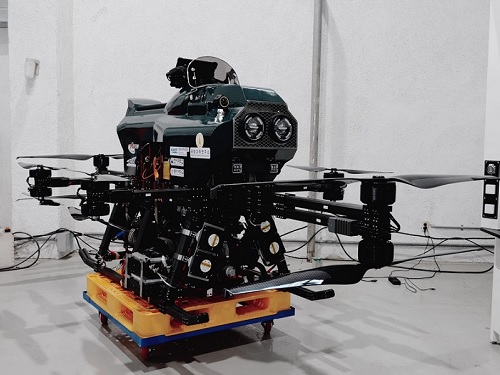 KAIST develops ‘Hoverbike’ to roam the future skies
< Photo 1. A group photo of the research team >
Hoverbike is a kind of next-generation mobility that can complement the existing transportation system and can be used as an air transportation means without traffic congestion through high-weight payloads and long-distance flights. It is expected that domestic researchers will contribute to the development of the domestic PAV* and UAM markets by developing a domestically developed manned/unmanned hybrid aircraft that escapes dependence on foreign technology through the development of a high-performance hoverbike.
*PAV: Personal Aerial Vehicle. It is a key element of future urban air mobility (UAM, Urban Air Mobility) and constitutes an important part of the next-generation transportation system.
KAIST (President Kwang-Hyung Lee) announced on the 27th of December that the research team of Professor Hyochoong Bang of the Department of Aerospace Engineering successfully developed the core technology of a highly reliable multipurpose vertical takeoff and landing hoverbike that can be operated by both manned and unmanned vehicles.
This research was participated by the research teams of Professor Jae-Hung Han, Professor Ji-yun Lee, Professor Jae-myung Ahn, Professor Han-Lim Choi, and Professor Chang-Hun Lee of the Department of Aerospace Engineering at KAIST, Professor Dongjin Lee of the Department of Unmanned Aerial Vehicles at Hanseo University, and Professor Jong-Oh Park of the Department of Electronics Engineering at Dong-A University.
The research team secured key technologies related to the optimal design of a multipurpose aircraft, hybrid propulsion system, highly reliable precision navigation and flight control system, autonomous flight, and fault detection for the development of a high-performance hoverbike.
< Figure 1. Key features of high-reliability multi-purpose hoverbike >
The hoverbike platform introduced a gasoline engine-based hybrid system to overcome the shortcomings of battery-based drones, achieving approximately 60% better performance and maximum payload weight compared to overseas technology levels. Through this, it is expected to be utilized in various fields such as emergency supply delivery, logistics, and rescue activities for civilian use, and military transport and mission support for military use.
The navigation system was applied by implementing multi-sensor fusion technology based on DGPS/INS* to enable stable flight even in environments without GPS or with weak signals using high-reliability precision navigation technology.
*DGPS/INS: Navigation solution combining high accuracy of Differential GPS (DGPS) and Inertial Navigation System (INS)
In addition, high-reliability flight control technology was developed to enable reliable maneuvering even under external factors such as payload and wind, and model uncertainty, and fault detection technology was also developed.
A guidance technique to automatically land on a helipad after selecting a safe automatic landing area by configuring a high-reliability autonomous flight system was implemented with high accuracy. Stable operation is possible even in complex environments through obstacle avoidance and automatic landing autonomous flight technology.
< Figure 2. Hoverbike prototype model >
Professor Hyochoong Bang, the research director, emphasized, “We have proven the high practicality of the hoverbike in various environments through high-reliability flight control and precision navigation technology.” He added, “The hoverbike is a promising research result that can not only provide a major path leading to PAVs and future aircraft, but also surpass existing drone technology by several levels. This achievement is even more meaningful because it is the result of five years of effort by eight joint research teams, including the project’s practitioners, PhD students Kwangwoo Jang and Hyungjoo Ahn.”
This study aims to secure core technologies for manned/unmanned multipurpose hoverbikes that can be utilized as new concept aircraft in the defense and civilian sectors. It started as the Defense Acquisition Program Administration’s Defense Technology for Future Challenge Research and Development Project in 2019 and was completed in 2024 under the management of the Agency for Defense Development. It is scheduled to be exhibited for the first time at the 2025 Drone Show Korea (DSK2025), which will be held at BEXCO in Busan from February 26 to 28, 2025.
2024.12.27 View 4880
KAIST develops ‘Hoverbike’ to roam the future skies
< Photo 1. A group photo of the research team >
Hoverbike is a kind of next-generation mobility that can complement the existing transportation system and can be used as an air transportation means without traffic congestion through high-weight payloads and long-distance flights. It is expected that domestic researchers will contribute to the development of the domestic PAV* and UAM markets by developing a domestically developed manned/unmanned hybrid aircraft that escapes dependence on foreign technology through the development of a high-performance hoverbike.
*PAV: Personal Aerial Vehicle. It is a key element of future urban air mobility (UAM, Urban Air Mobility) and constitutes an important part of the next-generation transportation system.
KAIST (President Kwang-Hyung Lee) announced on the 27th of December that the research team of Professor Hyochoong Bang of the Department of Aerospace Engineering successfully developed the core technology of a highly reliable multipurpose vertical takeoff and landing hoverbike that can be operated by both manned and unmanned vehicles.
This research was participated by the research teams of Professor Jae-Hung Han, Professor Ji-yun Lee, Professor Jae-myung Ahn, Professor Han-Lim Choi, and Professor Chang-Hun Lee of the Department of Aerospace Engineering at KAIST, Professor Dongjin Lee of the Department of Unmanned Aerial Vehicles at Hanseo University, and Professor Jong-Oh Park of the Department of Electronics Engineering at Dong-A University.
The research team secured key technologies related to the optimal design of a multipurpose aircraft, hybrid propulsion system, highly reliable precision navigation and flight control system, autonomous flight, and fault detection for the development of a high-performance hoverbike.
< Figure 1. Key features of high-reliability multi-purpose hoverbike >
The hoverbike platform introduced a gasoline engine-based hybrid system to overcome the shortcomings of battery-based drones, achieving approximately 60% better performance and maximum payload weight compared to overseas technology levels. Through this, it is expected to be utilized in various fields such as emergency supply delivery, logistics, and rescue activities for civilian use, and military transport and mission support for military use.
The navigation system was applied by implementing multi-sensor fusion technology based on DGPS/INS* to enable stable flight even in environments without GPS or with weak signals using high-reliability precision navigation technology.
*DGPS/INS: Navigation solution combining high accuracy of Differential GPS (DGPS) and Inertial Navigation System (INS)
In addition, high-reliability flight control technology was developed to enable reliable maneuvering even under external factors such as payload and wind, and model uncertainty, and fault detection technology was also developed.
A guidance technique to automatically land on a helipad after selecting a safe automatic landing area by configuring a high-reliability autonomous flight system was implemented with high accuracy. Stable operation is possible even in complex environments through obstacle avoidance and automatic landing autonomous flight technology.
< Figure 2. Hoverbike prototype model >
Professor Hyochoong Bang, the research director, emphasized, “We have proven the high practicality of the hoverbike in various environments through high-reliability flight control and precision navigation technology.” He added, “The hoverbike is a promising research result that can not only provide a major path leading to PAVs and future aircraft, but also surpass existing drone technology by several levels. This achievement is even more meaningful because it is the result of five years of effort by eight joint research teams, including the project’s practitioners, PhD students Kwangwoo Jang and Hyungjoo Ahn.”
This study aims to secure core technologies for manned/unmanned multipurpose hoverbikes that can be utilized as new concept aircraft in the defense and civilian sectors. It started as the Defense Acquisition Program Administration’s Defense Technology for Future Challenge Research and Development Project in 2019 and was completed in 2024 under the management of the Agency for Defense Development. It is scheduled to be exhibited for the first time at the 2025 Drone Show Korea (DSK2025), which will be held at BEXCO in Busan from February 26 to 28, 2025.
2024.12.27 View 4880 -
 KAIST Honors BMW and Hyundai with the 2022 Future Mobility of the Year Award
BMW ‘iVision Circular’, Commercial Vehicle-Hyundai Motors ‘Trailer Drone’ selected as winners of the international awards for concept cars established by KAIST Cho Chun Shik Graduate School of Mobility to honor car makers that strive to present new visions in the field of eco-friendly design of automobiles and unmanned logistics.
KAIST (President Kwang Hyung Lee) hosted the “2022 Future Mobility of the Year (FMOTY) Awards” at the Convention Hall of the BEXCO International Motor Show at Busan in the afternoon of the 14th.
The Future Mobility of the Year Awards is an award ceremony that selects a model that showcases useful transportation technology and innovative service concepts for the future society among the set of concept cars exhibited at the motor show.
As a one-of-a-kind international concept car awards established by KAIST's Cho Chun Shik Graduate School of Mobility (Headed by Professor Jang In-Gwon), the auto journalists from 11 countries were invited to be the jurors to select the winner. With the inaugural awards ceremony held in 2019, over the past three years, automakers from around the globe, including internationally renowned automakers, such as, Volvo/Toyota (2019), Honda/Hyundai (2020), and Renault (2021), even a new start-up car manufacturer like Canoo, the winner of last year’s award for commercial vehicles, were honored for their award-winning works.
At this year’s awards ceremony, the 4th of its kind, BMW's “iVision Circular” and Hyundai's “'Trailer Drone” were selected as the best concept cars of the year, the former from the Private Mobility category and the latter from the Public & Commercial Vehicles category.
The jury consisting of 16 domestic and foreign auto journalists, including BBC Top Gear's Paul Horrell and Car Magazine’s Georg Kacher, evaluated 53 concept car contestants that made their entry last year. The jurors’ general comment was that while the trend of the global automobile market flowing fast towards electric vehicles, this year's award-winning works presented a new vision in the field of eco-friendly design and unmanned logistics.
Private Mobility Categry Winner: BMW iVision Circular
BMW's 'iVision Circular', the winner of the Private Mobility category, is an eco-friendly compact car in which all parts of the vehicle are designed with recycled and/or natural materials. It has received favorable reviews for its in-depth implementation of the concept of a futuristic eco-friendly car by manufacturing the tires from natural rubber and adopting a design that made recycling of its parts very easily when the car is to be disposed of.
Public & Commercial Vehicles Categry Winner: Hyundai Trailer Drone
Hyundai Motor Company’s “Trailer Drone”, the winner of the Public & Commercial Vehicles category, is an eco-friendly autonomous driving truck that can transport large-scale logistics from a port to a destination without a human driver while two unmanned vehicles push and drag a trailer. The concept car won supports from a large number of judges for the blueprint it presented for a groundbreaking logistics service that applied both eco-friendly hydrogen fuel cell and fully autonomous driving technology.
Jurors from overseas congratulated the development team of BMW and Hyundai Motor Company via a video message for providing a new direction for the global automobile industry as it strives to transform in line with the changes in the post-pandemic era.
Professor Bo-won Kim, the Vice President for Planning and Budget of KAIST, who presented the awards, said, “It is time for the K-Mobility wave to sweep over the global mobility industry.” “KAIST will lead in the various fields of mobility technologies to support global automakers,” he added.
Splitting the center are KAIST Vice President Bo-Won Kim on the right, and Seong-Kwon Lee,
the Deputy Mayor of the City of Busan on the left. To Kim's left is the Senior VP of BMW Asia-Pacific, Eastern Europe, Middle East, Africa, Jean-Philippe Parain, and to Lee's Right is Sangyup Lee,
the Head of Hyundai Motor Design Center and the Executive VP of Hyundai Motors.
At the ceremony, along with KAIST officials, including Vice President Bo-Won Kim and Professor In-Gwon Jang, the Head of Cho Chun Shik Graduate School of Mobility, are the Deputy Mayor Seong-Kwon Lee of the City of Busan and the figures from the automobile industry, including Jean-Philippe Parain, the Senior Vice President of BMW Asia-Pacific, Eastern Europe, Middle East, Africa, who is visiting Korea to receive the '2022 Future Mobility' award, and Sangyup Lee, the Head of Hyundai Motor Design Center and the Executive Vice President of Hyundai Motor Company, were in the attendance.
More information about the awards ceremony and winning works are available at the official website of this year's Future Mobility Awards (www.fmoty.org).
Profile:In-Gwon Jang, Ph.D.Presidentthe Organizing Committeethe Future Mobility of the Year Awardshttp://www.fmoty.org/
Head ProfessorKAIST Cho Chun Shik Graduate School of Mobilityhttps://gt.kaist.ac.kr
2022.07.14 View 16200
KAIST Honors BMW and Hyundai with the 2022 Future Mobility of the Year Award
BMW ‘iVision Circular’, Commercial Vehicle-Hyundai Motors ‘Trailer Drone’ selected as winners of the international awards for concept cars established by KAIST Cho Chun Shik Graduate School of Mobility to honor car makers that strive to present new visions in the field of eco-friendly design of automobiles and unmanned logistics.
KAIST (President Kwang Hyung Lee) hosted the “2022 Future Mobility of the Year (FMOTY) Awards” at the Convention Hall of the BEXCO International Motor Show at Busan in the afternoon of the 14th.
The Future Mobility of the Year Awards is an award ceremony that selects a model that showcases useful transportation technology and innovative service concepts for the future society among the set of concept cars exhibited at the motor show.
As a one-of-a-kind international concept car awards established by KAIST's Cho Chun Shik Graduate School of Mobility (Headed by Professor Jang In-Gwon), the auto journalists from 11 countries were invited to be the jurors to select the winner. With the inaugural awards ceremony held in 2019, over the past three years, automakers from around the globe, including internationally renowned automakers, such as, Volvo/Toyota (2019), Honda/Hyundai (2020), and Renault (2021), even a new start-up car manufacturer like Canoo, the winner of last year’s award for commercial vehicles, were honored for their award-winning works.
At this year’s awards ceremony, the 4th of its kind, BMW's “iVision Circular” and Hyundai's “'Trailer Drone” were selected as the best concept cars of the year, the former from the Private Mobility category and the latter from the Public & Commercial Vehicles category.
The jury consisting of 16 domestic and foreign auto journalists, including BBC Top Gear's Paul Horrell and Car Magazine’s Georg Kacher, evaluated 53 concept car contestants that made their entry last year. The jurors’ general comment was that while the trend of the global automobile market flowing fast towards electric vehicles, this year's award-winning works presented a new vision in the field of eco-friendly design and unmanned logistics.
Private Mobility Categry Winner: BMW iVision Circular
BMW's 'iVision Circular', the winner of the Private Mobility category, is an eco-friendly compact car in which all parts of the vehicle are designed with recycled and/or natural materials. It has received favorable reviews for its in-depth implementation of the concept of a futuristic eco-friendly car by manufacturing the tires from natural rubber and adopting a design that made recycling of its parts very easily when the car is to be disposed of.
Public & Commercial Vehicles Categry Winner: Hyundai Trailer Drone
Hyundai Motor Company’s “Trailer Drone”, the winner of the Public & Commercial Vehicles category, is an eco-friendly autonomous driving truck that can transport large-scale logistics from a port to a destination without a human driver while two unmanned vehicles push and drag a trailer. The concept car won supports from a large number of judges for the blueprint it presented for a groundbreaking logistics service that applied both eco-friendly hydrogen fuel cell and fully autonomous driving technology.
Jurors from overseas congratulated the development team of BMW and Hyundai Motor Company via a video message for providing a new direction for the global automobile industry as it strives to transform in line with the changes in the post-pandemic era.
Professor Bo-won Kim, the Vice President for Planning and Budget of KAIST, who presented the awards, said, “It is time for the K-Mobility wave to sweep over the global mobility industry.” “KAIST will lead in the various fields of mobility technologies to support global automakers,” he added.
Splitting the center are KAIST Vice President Bo-Won Kim on the right, and Seong-Kwon Lee,
the Deputy Mayor of the City of Busan on the left. To Kim's left is the Senior VP of BMW Asia-Pacific, Eastern Europe, Middle East, Africa, Jean-Philippe Parain, and to Lee's Right is Sangyup Lee,
the Head of Hyundai Motor Design Center and the Executive VP of Hyundai Motors.
At the ceremony, along with KAIST officials, including Vice President Bo-Won Kim and Professor In-Gwon Jang, the Head of Cho Chun Shik Graduate School of Mobility, are the Deputy Mayor Seong-Kwon Lee of the City of Busan and the figures from the automobile industry, including Jean-Philippe Parain, the Senior Vice President of BMW Asia-Pacific, Eastern Europe, Middle East, Africa, who is visiting Korea to receive the '2022 Future Mobility' award, and Sangyup Lee, the Head of Hyundai Motor Design Center and the Executive Vice President of Hyundai Motor Company, were in the attendance.
More information about the awards ceremony and winning works are available at the official website of this year's Future Mobility Awards (www.fmoty.org).
Profile:In-Gwon Jang, Ph.D.Presidentthe Organizing Committeethe Future Mobility of the Year Awardshttp://www.fmoty.org/
Head ProfessorKAIST Cho Chun Shik Graduate School of Mobilityhttps://gt.kaist.ac.kr
2022.07.14 View 16200 -
 Research Finds Digital Music Streaming Consumption Dropped as a Result of Covid-19 and Lockdowns
Decline in human mobility has stunning consequences for content streaming
The Covid-19 pandemic and lockdowns significantly reduced the consumption of audio music streaming in many countries as people turned to video platforms. On average, audio music consumption decreased by 12.5% after the World Health Organization’s (WHO) pandemic declaration in March 2020.
Music streaming services were an unlikely area hit hard by the Covid-19 pandemic. New research in Marketing Science found that the drop in people’s mobility during the pandemic significantly reduced the consumption of audio music streaming. Instead, people turned more to video platforms.
“On average, audio music consumption decreased by more than 12% after the World Health Organization’s (WHO) pandemic declaration on March 11, 2020. As a result, during the pandemic, Spotify lost 838 million dollars of revenue in the first three quarters of 2020,” said Jaeung Sim, a PhD candidate in management engineering at KAIST and one of the authors of the research study on this phenomenon. “Our results showed that human mobility plays a much larger role in the audio consumption of music than previously thought.”
The study, “Frontiers: Virus Shook the Streaming Star: Estimating the Covid-19 Impact on Music Consumption,” conducted by Sim and Professor Daegon Cho of KAIST, Youngdeok Hwang of City University of New York, and Rahul Telang of Carnegie Mellon University, looked at online music streaming data for top songs for two years in 60 countries, as well as Covid-19 cases, lockdown statistics, and daily mobility data, to determine the nature of the changes.
The study showed how the pandemic adversely impacted music streaming services despite the common expectation that the pandemic would universally benefit online medias platforms. This implies that the substantially changing media consumption environment can place streaming music in fiercer competition with other media forms that offer more dynamic and vivid experiences to consumers.
The researchers found that music consumption through video platforms was positively associated with the severity of Covid-19, lockdown policies, and time spent at home.
-PublicationJaeung Sim, Daegon Cho, Youngdeok Hwang, and Rahul Telang,“Frontiers: Virus Shook the Streaming Star: Estimating the Covid-19 Impact on Music Consumption,” November 30 in Marketing Science online (doi.org/10.1287/mksc.2021.1321)
-Profile Professor Daegon ChoGraduate School of Information and Media ManagementCollege of BusinessKAIST
2022.02.15 View 10940
Research Finds Digital Music Streaming Consumption Dropped as a Result of Covid-19 and Lockdowns
Decline in human mobility has stunning consequences for content streaming
The Covid-19 pandemic and lockdowns significantly reduced the consumption of audio music streaming in many countries as people turned to video platforms. On average, audio music consumption decreased by 12.5% after the World Health Organization’s (WHO) pandemic declaration in March 2020.
Music streaming services were an unlikely area hit hard by the Covid-19 pandemic. New research in Marketing Science found that the drop in people’s mobility during the pandemic significantly reduced the consumption of audio music streaming. Instead, people turned more to video platforms.
“On average, audio music consumption decreased by more than 12% after the World Health Organization’s (WHO) pandemic declaration on March 11, 2020. As a result, during the pandemic, Spotify lost 838 million dollars of revenue in the first three quarters of 2020,” said Jaeung Sim, a PhD candidate in management engineering at KAIST and one of the authors of the research study on this phenomenon. “Our results showed that human mobility plays a much larger role in the audio consumption of music than previously thought.”
The study, “Frontiers: Virus Shook the Streaming Star: Estimating the Covid-19 Impact on Music Consumption,” conducted by Sim and Professor Daegon Cho of KAIST, Youngdeok Hwang of City University of New York, and Rahul Telang of Carnegie Mellon University, looked at online music streaming data for top songs for two years in 60 countries, as well as Covid-19 cases, lockdown statistics, and daily mobility data, to determine the nature of the changes.
The study showed how the pandemic adversely impacted music streaming services despite the common expectation that the pandemic would universally benefit online medias platforms. This implies that the substantially changing media consumption environment can place streaming music in fiercer competition with other media forms that offer more dynamic and vivid experiences to consumers.
The researchers found that music consumption through video platforms was positively associated with the severity of Covid-19, lockdown policies, and time spent at home.
-PublicationJaeung Sim, Daegon Cho, Youngdeok Hwang, and Rahul Telang,“Frontiers: Virus Shook the Streaming Star: Estimating the Covid-19 Impact on Music Consumption,” November 30 in Marketing Science online (doi.org/10.1287/mksc.2021.1321)
-Profile Professor Daegon ChoGraduate School of Information and Media ManagementCollege of BusinessKAIST
2022.02.15 View 10940 -
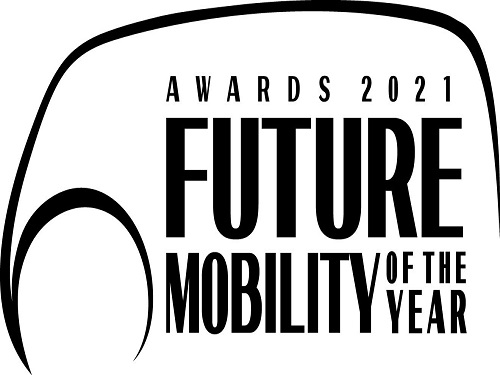 Renault 5 EV and Canoo’s Pickup Truck Win the 2021 FMOTY Awards
KAIST Future Mobility of the Year Awards recognize the most innovative concept cars of the year
The Renault 5 EV from France and a pickup truck from the US startup Canoo won the 2021 Future Mobility of the Year Awards (FMOTY) hosted by the Cho Chun Shik Graduate School of Green Transportation at KAIST. The awards ceremony was held at Renault Samsung Motors in Seoul on November 25.
KAIST began the FMOTY in 2019 to advance future car technology and stimulate growth in the industry. The award recognizes the most innovative ideas for making the most futuristic concept car and improving the technological and social value of the industry.
The awards ceremony was attended by KAIST President Kwang Hyung Lee, the dean of the Cho Chun Shik Graduate School of Green Transportation In Gwun Jang, CEO of Renault Samsung Motors Dominique Signora, and CEO of Canoo Tony Aquila. President Lee said, “The new world order will be impacted by new technology developers who envision the future. Their innovation and creative ideas will open a new world of sustainable future transportation.”
Out of the 46 concept cars revealed at global motor exhibitions between last year and the first quarter of this year, models demonstrating transport technology useful for future society and innovative service were selected in the categories of passenger cars and commercial vehicles.
Sixteen automotive journalists from 11 countries, including the chief editor of Car Magazine in Germany Georg Kacher and editorial director of BBC Top Gear Charlie Turner, participated as judges.
This year’s award for the best concept car for a passenger vehicle went to an electric vehicle, the Renault 5 EV. The compact electric car was highly regarded for its practicality and environmental friendliness. A pickup truck by Canoo, an American EV manufacturing start-up, won the award in the commercial vehicle category. The pickup features an innovative design allowing for a variety of functions topped with a competitive price and it received overwhelming support from the judges.
While Hyundai Motors swept both prizes at the awards last year and demonstrated the potential of Korean concept cars, Canoo’s win in the commercial vehicle section as a young American venture company brought attention to the changing dynamics in the automotive market. This shows that young EV start-ups can compete with existing car companies as the automotive paradigm is shifting from those with internal combustion engines to EVs.
The awards organizers said that the Cho Chun Shik Graduate School of Green Transportation will continue to hold the FMOTY to lead the fast-changing global mobility market. For more information, please visit www.fmoty.org.
2021.11.26 View 8353
Renault 5 EV and Canoo’s Pickup Truck Win the 2021 FMOTY Awards
KAIST Future Mobility of the Year Awards recognize the most innovative concept cars of the year
The Renault 5 EV from France and a pickup truck from the US startup Canoo won the 2021 Future Mobility of the Year Awards (FMOTY) hosted by the Cho Chun Shik Graduate School of Green Transportation at KAIST. The awards ceremony was held at Renault Samsung Motors in Seoul on November 25.
KAIST began the FMOTY in 2019 to advance future car technology and stimulate growth in the industry. The award recognizes the most innovative ideas for making the most futuristic concept car and improving the technological and social value of the industry.
The awards ceremony was attended by KAIST President Kwang Hyung Lee, the dean of the Cho Chun Shik Graduate School of Green Transportation In Gwun Jang, CEO of Renault Samsung Motors Dominique Signora, and CEO of Canoo Tony Aquila. President Lee said, “The new world order will be impacted by new technology developers who envision the future. Their innovation and creative ideas will open a new world of sustainable future transportation.”
Out of the 46 concept cars revealed at global motor exhibitions between last year and the first quarter of this year, models demonstrating transport technology useful for future society and innovative service were selected in the categories of passenger cars and commercial vehicles.
Sixteen automotive journalists from 11 countries, including the chief editor of Car Magazine in Germany Georg Kacher and editorial director of BBC Top Gear Charlie Turner, participated as judges.
This year’s award for the best concept car for a passenger vehicle went to an electric vehicle, the Renault 5 EV. The compact electric car was highly regarded for its practicality and environmental friendliness. A pickup truck by Canoo, an American EV manufacturing start-up, won the award in the commercial vehicle category. The pickup features an innovative design allowing for a variety of functions topped with a competitive price and it received overwhelming support from the judges.
While Hyundai Motors swept both prizes at the awards last year and demonstrated the potential of Korean concept cars, Canoo’s win in the commercial vehicle section as a young American venture company brought attention to the changing dynamics in the automotive market. This shows that young EV start-ups can compete with existing car companies as the automotive paradigm is shifting from those with internal combustion engines to EVs.
The awards organizers said that the Cho Chun Shik Graduate School of Green Transportation will continue to hold the FMOTY to lead the fast-changing global mobility market. For more information, please visit www.fmoty.org.
2021.11.26 View 8353 -
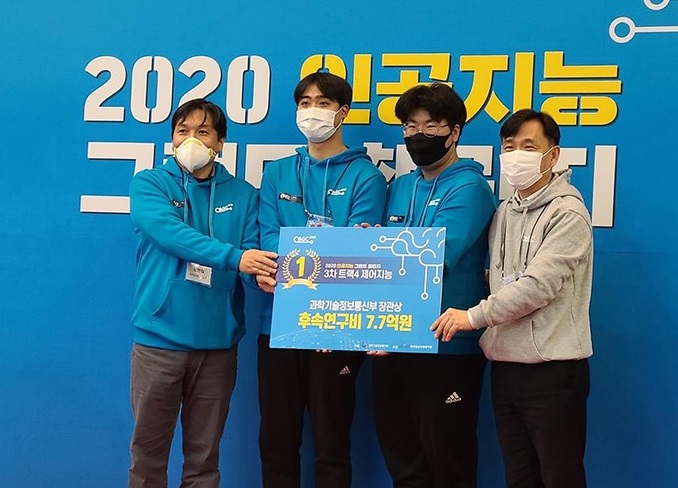 Team USRG’s Winning Streak Continues at the AI Grand Challenge
Team USRG (Unmanned Systems Research Group) led by Professor Hyunchul Shim from the School of Electrical Engineering has won the AI Grand Challenge 2020 held on Nov. 23 at Kintex in Ilsan, Kyonggi-do for the second consecutive year. The team received 7.7 million KRW in research funding from the Ministry of Science and ICT, the organizer of the challenge.
The team took a little over two minutes to complete the rescue operation mission of the challenge. The mission included swerving around seven obstacles, airdropping an aid package, and safely landing after identifying the landing spot. Their drone is the only one that successfully passed through a 10-meter tunnel out of five pre-qualified teams: three from universities and two from companies.
The AI Grand Challenge, which began in 2017, was designed to promote AI technology and its applications for addressing high-risk technical challenges, especially for conducting complex disaster relief operations.
For autonomous flying drones, swerving to avoid objects has always been an essential skill and a big challenge. For their flawless performance in the rescue operation, the team loaded an AI algorithm and upgraded their drone by improving the LiDAR-based localization system and a stronger propulsion system to carry more sensors. The drone weighs 2.4 kg and carries a small yet powerful computer with a GPU.
This AI-powered drone can complete rescue missions more efficiently in complicated and disastrous environments by precisely comprehending where the drone should go without needing GPS. The team also designed an all-in-one prop guard and installed a gripper onto the bottom of the drone to hold the aid package securely.
“We tried hard to improve our localization system better to resolve issues we had in the previous event,” said Professor Shim. Two PhD candidates, Han-Sob Lee and Bo-Sung Kim played a critical role in developing this drone.
After their two-year winning streak, their prize money now totals 2.4 billion KRW, equivalent to the winning prize of the DARPA Challenge. As the winning team, they will collaborate with other champions at the AI track challenge to develop rescue mission technology for a more complex environment.
“The importance of AI technology is continuing to grow and the government is providing large amounts of funding for research in this field. We would like to develop very competitive technology that will work in the real world,” Professor Shim added.
His group is investigating a wide array of AI technologies applicable to unmanned vehicles including indoor flying drones, self-driving cars, delivery robots, and a tram that circles the campus.
2020.12.01 View 9781
Team USRG’s Winning Streak Continues at the AI Grand Challenge
Team USRG (Unmanned Systems Research Group) led by Professor Hyunchul Shim from the School of Electrical Engineering has won the AI Grand Challenge 2020 held on Nov. 23 at Kintex in Ilsan, Kyonggi-do for the second consecutive year. The team received 7.7 million KRW in research funding from the Ministry of Science and ICT, the organizer of the challenge.
The team took a little over two minutes to complete the rescue operation mission of the challenge. The mission included swerving around seven obstacles, airdropping an aid package, and safely landing after identifying the landing spot. Their drone is the only one that successfully passed through a 10-meter tunnel out of five pre-qualified teams: three from universities and two from companies.
The AI Grand Challenge, which began in 2017, was designed to promote AI technology and its applications for addressing high-risk technical challenges, especially for conducting complex disaster relief operations.
For autonomous flying drones, swerving to avoid objects has always been an essential skill and a big challenge. For their flawless performance in the rescue operation, the team loaded an AI algorithm and upgraded their drone by improving the LiDAR-based localization system and a stronger propulsion system to carry more sensors. The drone weighs 2.4 kg and carries a small yet powerful computer with a GPU.
This AI-powered drone can complete rescue missions more efficiently in complicated and disastrous environments by precisely comprehending where the drone should go without needing GPS. The team also designed an all-in-one prop guard and installed a gripper onto the bottom of the drone to hold the aid package securely.
“We tried hard to improve our localization system better to resolve issues we had in the previous event,” said Professor Shim. Two PhD candidates, Han-Sob Lee and Bo-Sung Kim played a critical role in developing this drone.
After their two-year winning streak, their prize money now totals 2.4 billion KRW, equivalent to the winning prize of the DARPA Challenge. As the winning team, they will collaborate with other champions at the AI track challenge to develop rescue mission technology for a more complex environment.
“The importance of AI technology is continuing to grow and the government is providing large amounts of funding for research in this field. We would like to develop very competitive technology that will work in the real world,” Professor Shim added.
His group is investigating a wide array of AI technologies applicable to unmanned vehicles including indoor flying drones, self-driving cars, delivery robots, and a tram that circles the campus.
2020.12.01 View 9781 -
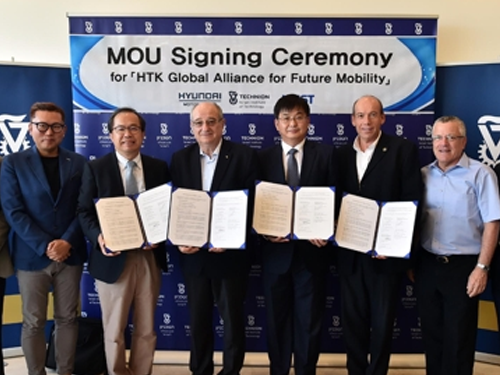 KAIST Partners with Technion and Hyundai Motors for Future Mobility Technology Development
(KAIST Associate Vice President of Research Joung-Ho Kim(third from left) poses with Technion President Pereta Lavie and CTO Tae Won Im of Hyundai Motors)
KAIST has partnered with the Israel Institute of Technology, Technion, and Hyundai Motors to take the lead in the field of future mobility technologies. The three parties signed a consortium of global alliance for future mobility partnership at Technion on Sept. 5. KAIST Associate Vice President of Research Kim Joung-Ho, Hyundai Motor’s Central Advanced Research and Engineering CTO Tae Won Lim, and Technion President Peretz Lavie signed the MOU.
The three parties agreed to conduct joint research on hi-tech mobility areas including self-driving systems, cyber security, and AI in mobility. With the signing of the consortium, KAIST's technology in AI, semiconductors, and autonomous cars will produce synergy with Technion’s connected car solutions, advancing Hyundai Motor's competitiveness in the future mobility market.
In addition to the consortium, the three parties will set-up a startup consulting committee, which will provide consulting services for nurturing venture startups with creative ideas and outstanding technological prowess in their host countries.
2017.09.07 View 7232
KAIST Partners with Technion and Hyundai Motors for Future Mobility Technology Development
(KAIST Associate Vice President of Research Joung-Ho Kim(third from left) poses with Technion President Pereta Lavie and CTO Tae Won Im of Hyundai Motors)
KAIST has partnered with the Israel Institute of Technology, Technion, and Hyundai Motors to take the lead in the field of future mobility technologies. The three parties signed a consortium of global alliance for future mobility partnership at Technion on Sept. 5. KAIST Associate Vice President of Research Kim Joung-Ho, Hyundai Motor’s Central Advanced Research and Engineering CTO Tae Won Lim, and Technion President Peretz Lavie signed the MOU.
The three parties agreed to conduct joint research on hi-tech mobility areas including self-driving systems, cyber security, and AI in mobility. With the signing of the consortium, KAIST's technology in AI, semiconductors, and autonomous cars will produce synergy with Technion’s connected car solutions, advancing Hyundai Motor's competitiveness in the future mobility market.
In addition to the consortium, the three parties will set-up a startup consulting committee, which will provide consulting services for nurturing venture startups with creative ideas and outstanding technological prowess in their host countries.
2017.09.07 View 7232 -
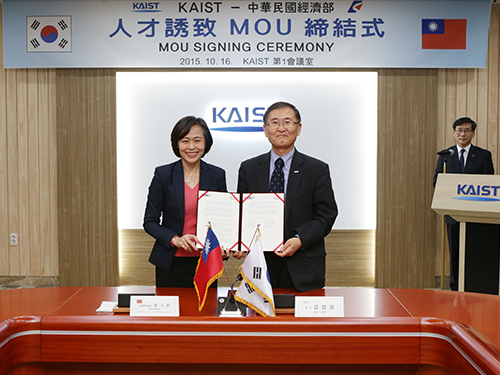 KAIST Agrees to Personnel Exchange with the Ministry of Economic Affairs of the Republic of China
A delegation from the Ministry of Economic Affairs (MOEA) of the Republic of China (ROC) visited KAIST on October 16, 2015.
President Steve Kang of KAIST and Director General Yu-Ping Lien of the Department of Investment Services, MOEA, signed a memorandum of understanding (MOU) on exchanging personnel, recruiting and attracting top talents, and sharing job information.
With the MOU, KAIST and MOEA will develop a mobility program for students in Korea and ROC to help them seek employment opportunities in both nations. Director General Lien hoped that the MOU would bring more of KAIST students in the information technology field to work in ROC.
President Kang responded,
“KAIST has fostered highly talented engineers and researchers across all fields of science and engineering. If these students can have a place in ROC to realize their potential, this certainly could benefit the two nations.”
In the picture from left to right is Director General Yu-Ping Lien of the Department of Investment Services, the Ministry of Economic Affairs of the Republic of China and President Steve Kang of KAIST.
2015.10.17 View 6123
KAIST Agrees to Personnel Exchange with the Ministry of Economic Affairs of the Republic of China
A delegation from the Ministry of Economic Affairs (MOEA) of the Republic of China (ROC) visited KAIST on October 16, 2015.
President Steve Kang of KAIST and Director General Yu-Ping Lien of the Department of Investment Services, MOEA, signed a memorandum of understanding (MOU) on exchanging personnel, recruiting and attracting top talents, and sharing job information.
With the MOU, KAIST and MOEA will develop a mobility program for students in Korea and ROC to help them seek employment opportunities in both nations. Director General Lien hoped that the MOU would bring more of KAIST students in the information technology field to work in ROC.
President Kang responded,
“KAIST has fostered highly talented engineers and researchers across all fields of science and engineering. If these students can have a place in ROC to realize their potential, this certainly could benefit the two nations.”
In the picture from left to right is Director General Yu-Ping Lien of the Department of Investment Services, the Ministry of Economic Affairs of the Republic of China and President Steve Kang of KAIST.
2015.10.17 View 6123 -
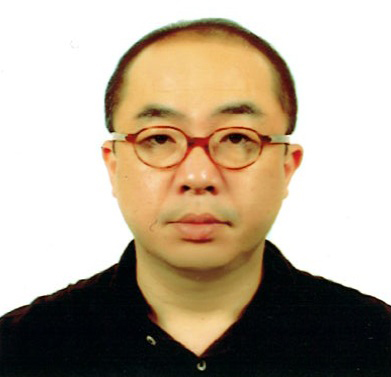 Prof. Song Chong received the IEEE William R. Bennett Prize Paper Award
The IEEE (Institute of Electrical and Electronics Engineers) Communications Society (ComSoc), a renowned global network of professionals with a common interest in advancing communications technologies, has announced the winner of the 2013 William R. Bennett Prize in the field of communications networking. The prize was given to a Korean research team led by Song Chong, Professor of Electrical Engineering at KAIST and Injong Rhee, Professor of Computer Science at North Carolina State University. In addition, Dr. Minsu Shin, Dr. Seongik Hong, and Dr. Seong Joon Kim of Samsung Electronics Co., Ltd. as well as Professor Kyunghan Lee from Ulsan National Institute of Science and Technology were recognized for their contribution.
The William R. Bennett Prize for communications networking has been awarded each year since 1994 in recognition of the best paper published in any journal financially sponsored or co-sponsored by ComSoc in the previous three calendar years. Only one paper per year is selected based on its quality, originality, scientific citation index, and peer reviews. Among the previous award winners are Robert Gallager of MIT, and Steven Low of the California Institute of Technology, and Kang G. Shin of the University of Michigan.
The Korean research team’s paper, On the Levy-Walk Nature of Human Mobility, was published in the June 2011 issue of IEEE/ACM Transactions on Networking, a bimonthly journal co-sponsored by the IEEE ComSoc, the IEEE Computer Society, and the Association for Computing Machinery (ACM) with its Special Interest Group on Data Communications (SIGCOMM).
In the paper, the research team proposed a new statistical model to effectively analyze the pattern of individual human mobility in daily life. The team handed out GPS (global positioning system) devices to 100 participants residing in five different university campuses in Korea and the US and collected data on their movements for 226 days. The mobility pattern obtained from the experiment predicted accurately how the participants actually moved around during their routines. Since publication, the paper has been cited by other papers approximately 350 times.
The team’s research results will apply to many fields such as the prevention and control of epidemics, the design of efficient communications networks, and the development of urban and transportation system.
The research team received the award on June 10th at the 2013 IEEE International Conference on Communications (ICC) held in Budapest, Hungary, from June 9-13, 2013.
Professor Song Chong
2013.07.06 View 15621
Prof. Song Chong received the IEEE William R. Bennett Prize Paper Award
The IEEE (Institute of Electrical and Electronics Engineers) Communications Society (ComSoc), a renowned global network of professionals with a common interest in advancing communications technologies, has announced the winner of the 2013 William R. Bennett Prize in the field of communications networking. The prize was given to a Korean research team led by Song Chong, Professor of Electrical Engineering at KAIST and Injong Rhee, Professor of Computer Science at North Carolina State University. In addition, Dr. Minsu Shin, Dr. Seongik Hong, and Dr. Seong Joon Kim of Samsung Electronics Co., Ltd. as well as Professor Kyunghan Lee from Ulsan National Institute of Science and Technology were recognized for their contribution.
The William R. Bennett Prize for communications networking has been awarded each year since 1994 in recognition of the best paper published in any journal financially sponsored or co-sponsored by ComSoc in the previous three calendar years. Only one paper per year is selected based on its quality, originality, scientific citation index, and peer reviews. Among the previous award winners are Robert Gallager of MIT, and Steven Low of the California Institute of Technology, and Kang G. Shin of the University of Michigan.
The Korean research team’s paper, On the Levy-Walk Nature of Human Mobility, was published in the June 2011 issue of IEEE/ACM Transactions on Networking, a bimonthly journal co-sponsored by the IEEE ComSoc, the IEEE Computer Society, and the Association for Computing Machinery (ACM) with its Special Interest Group on Data Communications (SIGCOMM).
In the paper, the research team proposed a new statistical model to effectively analyze the pattern of individual human mobility in daily life. The team handed out GPS (global positioning system) devices to 100 participants residing in five different university campuses in Korea and the US and collected data on their movements for 226 days. The mobility pattern obtained from the experiment predicted accurately how the participants actually moved around during their routines. Since publication, the paper has been cited by other papers approximately 350 times.
The team’s research results will apply to many fields such as the prevention and control of epidemics, the design of efficient communications networks, and the development of urban and transportation system.
The research team received the award on June 10th at the 2013 IEEE International Conference on Communications (ICC) held in Budapest, Hungary, from June 9-13, 2013.
Professor Song Chong
2013.07.06 View 15621 -
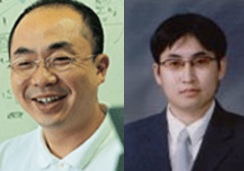 Prof. Chong Unveils New Human Movement Model
A KAIST research team headed by Prof. Song Chong of the School of Electrical Engineering and Computer Science has developed a new statistical model that simulates human mobility patterns, mimicking the way people move over the course of a day, a month or longer, university sources said on Tuesday (May 12).
The model, developed in collaboration with scientists at North Carolina State University, is the first to represent the regular movement patterns of humans using statistical data.
The model has a variety of potential uses, ranging from land use planning to public health studies on epidemic disease.
The researchers gave global positioning system (GPS) devices to approximately 100 volunteers at five locations in the U.S. and South Korea and tracked the participants" movements over time. By tracing the points where the study participants stopped, and their movement trajectories, researchers were able to determine patterns of mobility behavior.
The researchers were then able to emulate these fundamental statistical properties of human mobility into a model that could be used to represent the regular daily movement of humans. The model, called Self-similar Least Action Walk (SLAW), will have a wide array of practical applications.
The research, "SLAW: A Mobility Model for Human Walks," was presented on April 20 at the 28th IEEE Conference on Computer Communications in Rio de Janeiro, Brazil. The National Science Foundation of the U.S. funded the research.
2009.05.13 View 15817
Prof. Chong Unveils New Human Movement Model
A KAIST research team headed by Prof. Song Chong of the School of Electrical Engineering and Computer Science has developed a new statistical model that simulates human mobility patterns, mimicking the way people move over the course of a day, a month or longer, university sources said on Tuesday (May 12).
The model, developed in collaboration with scientists at North Carolina State University, is the first to represent the regular movement patterns of humans using statistical data.
The model has a variety of potential uses, ranging from land use planning to public health studies on epidemic disease.
The researchers gave global positioning system (GPS) devices to approximately 100 volunteers at five locations in the U.S. and South Korea and tracked the participants" movements over time. By tracing the points where the study participants stopped, and their movement trajectories, researchers were able to determine patterns of mobility behavior.
The researchers were then able to emulate these fundamental statistical properties of human mobility into a model that could be used to represent the regular daily movement of humans. The model, called Self-similar Least Action Walk (SLAW), will have a wide array of practical applications.
The research, "SLAW: A Mobility Model for Human Walks," was presented on April 20 at the 28th IEEE Conference on Computer Communications in Rio de Janeiro, Brazil. The National Science Foundation of the U.S. funded the research.
2009.05.13 View 15817